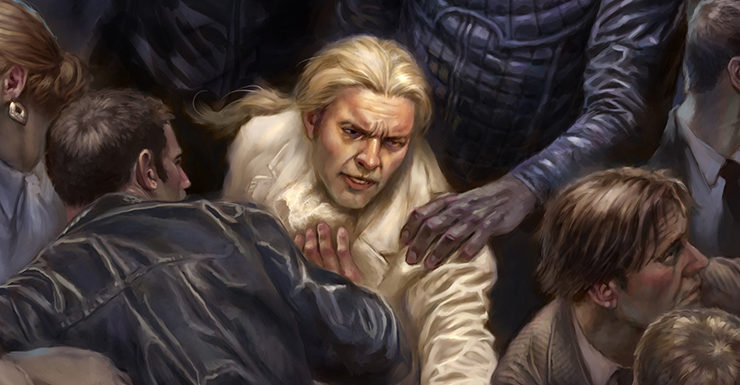C.J. Cherryh’s Foreigner series may not be the longest-running science fiction series still being published today, but it must certainly find itself among the longest to feature the same cast of characters. Emergence is the 19th in that series. It yet again deals with Bren Cameron, paidhi and ambassador between atevi and humans (though his duties have changed almost out of all recognition since Foreigner), and Cajeiri, the young heir to the aiji of the atevi, as they handle politics and consequences and the competing necessities of several different atevi factions—and another several human ones.
If you’re new to the Foreigner series, this is not the place to start. (The best advice is to start at the beginning, or else at book four, Precursor.) If you’re a fan, then it’s entirely likely that you already know whether or not you want to read Emergence: it does very similar things to its predecessors—although it suffers from the absence of the aiji-dowager, whose inimitable presence has improved every book that’s featured her.
Buy the Book


Emergence (Foreigner)
Although there are subtle differences to the usual pattern. Bren spends far less time than usual interacting with atevi. Nearly none, in fact, leaving aside his bodyguard: he spends Emergence on the island of Mospheira, representing the aiji to the Mospheiran humans, in a reversal of his original role. He’s now so acculturated to the atevi that human culture feels strange: it’s not his anymore, though he retains a residual loyalty to certain people and believes in doing his best to promote the best outcome for both humans and atevi.
Cajeiri, meanwhile, is no longer quite so young. He’s becoming a young adult instead of a child, and his reckless inquisitiveness is tempered by a better understanding of his responsibilities and of the currents of politics around him. In Emergence, he’s staying with his great-uncle, an atevi lord with enormous political influence who is a leader among the conservative traditionalists. Cajeiri’s visit with his great-uncle is a sign of his father’s support for that great-uncle, but shortly into Cajeiri’s stay, both Cajeiri and his great-uncle find themselves as the focus of an appeal concerning a vacant neighbouring lordship. Bad shit has been going down at Ajuri for a while—possibly since before Cajeiri’s mother, who is related to the Ajuri, was born—and a lot of it came to light during a recent crisis in which the aiji was overthrown and then restored to power. But not all of it: the full extent of the corruption in Ajuri has not yet come to light, and there is as yet no candidate for the lordship who can be relied upon to both stay alive and take the corruption in hand.
A large part of Emergence is dedicated to solving this problem. There’s a lot of tea and formal dinners and quiet political manoeuvring: a lot of talking and dealing with bureaucracy and attention paid to logistics. Like most of the Foreigner books, it’s a nice leisurely book about political discussions over tea, and bureaucratic manoeuvring while making sure one is wearing appropriate clothes, and if that is what you’re looking for, this will hit the spot nicely.
On the other hand, Emergence also reconfirmed to me that Cherryh really sucks at having women (especially human women) be named characters with personalities in the Foreigner series at anything like the frequency at which men get to be named characters with personalities. On Mospheira, Bren recruits three college students for a special duty: the students are secret fans of atevi literature and have some spoken fluency in the atevi language. All three of them are boys. Overall, my general impression of Cherryh’s Foreigner series is—well, the 1970s called. It wants its gender stereotypes and workplace gender ratios back. (And perish the thought that non-heterosexuals should exist.)
I enjoyed Emergence. It appears to resolve a handful of ongoing plot threads, while moving the characters into configurations that hint at something new. But I confess the leisurely pace of Cherryh’s plotting, combined with my frustration at the ongoing gender issues, combine to make me feel less enthusiasm than I might wish. If I were getting a copy myself, I’d wait for the paperback.
Emergence is available from DAW.
Liz Bourke is a cranky queer person who reads books. She holds a Ph.D in Classics from Trinity College, Dublin. Her first book, Sleeping With Monsters, a collection of reviews and criticism, is out now from Aqueduct Press. Find her at her blog, or find her on Twitter. She supports the work of the Irish Refugee Council and the Abortion Rights Campaign.










